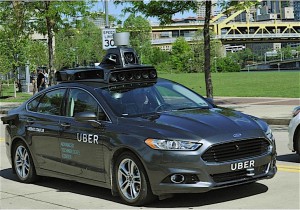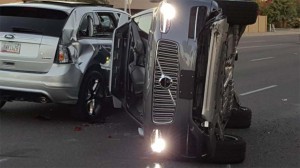
U.S. House Republicans passed a bill eliminated a state's ability to establish different autonomous driving rules than the federal government.
Automakers are celebrating as the U.S. House of Representatives passed the Self Drive Act, which cut back the regulations on testing and developing autonomous cars and light trucks.
The newly passed bill is designed to accelerate the timeframe for allowing self-driving vehicles to be on the roads for testing without humans behind the wheel. It also bars states from preventing such testing, which many car companies claim is critical to getting the vehicles to consumers within the next three to four years. The bill is being fast-tracked so no amendments can be added.
The legislation heads to the Senate where a bipartisan group is working on a similar measure, but hasn’t brought it to the floor for a vote. Not surprisingly, the auto industry has come out in favor of the revised guidelines and House bill.
According to a statement from the Alliance of Automotive Manufacturers, “Self-driving vehicle technology holds great promise to improve safety and transform mobility in the United States. Automakers have been developing these technologies for years and this legislation helps address a variety of barriers that otherwise block the ability to safely test and deploy these vehicle technologies.
(U.S. House to vote on broad autonomous vehicle bill. For the story, Click Here.)

An Uber Volvo XC90 was involved in a minor crash during a test program near Phoenix. Under the Self Drive Act, Uber's still required to report it.
“There is strong bi-partisan support for the committee’s self-driving vehicle legislation. We look forward to continue working with Members on both sides of the aisle in the House and the Senate to enhance auto safety and expanded mobility that will further solidify U.S. innovation and leadership.”
The legislation supports new guidelines finalized Aug. 31 by the Transportation Department for autonomous vehicle testing, which are set to be unveiled next week by U.S. Transportation Secretary Elaine Chao as self-driving testing site in Michigan.
The new parameters from the Trump Administration are expected to be a bit more lax than the initial ones set forth by the Obama Administration in 2016. Automakers have been pushing for less strenuous guidelines to help speed along the development of autonomous vehicles, and the new House legislation provides that.
(Click Here for more about Waymo’s autonomous ride-sharing program in Phoenix.)
“With this legislation, innovation can flourish without the heavy hand of government,” said Ohio Republican Bob Latta, who chairs the House Energy and Commerce subcommittee that developed the legislation.
The Self Drive Act provides exemptions to automakers for 25,000 autonomous test vehicles that don’t meet safety standards in the first year and rises to 100,000 vehicles over three years. Automakers would also be required to provide regulators with safety assessments, but unlike in the Obama Administration guidelines, makers wouldn’t need approval of new technologies in advance.
The bill puts the National Highway Traffic Safety Administration in charge of regulating the testing of autonomous vehicles, and requires NHTSA to develop rules for self-driving cars. Companies must draft security and privacy plans for autonomous vehicles and document their approach for ensuring self-driving car safety.
(To see more about other ride-hailing services testing self-driving vehicles, Click Here.)
The bill doesn’t satisfy safety advocacy groups, such as the Advocates for Highway and Auto Safety which sent a letter to lawmakers Tuesday suggesting that expanding the cap on safety exemptions to 100,000 vehicles per year could be dangerous and that the bill’s preemption of state authority is overly broad. The group also urged additional funding for NHTSA, according to Reuters.
